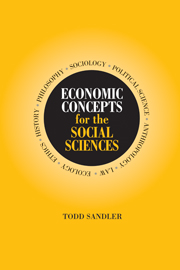Book contents
- Frontmatter
- Contents
- Table and Figures
- Preface
- 1 Economics without Apology
- 2 Back to the Future: Political Economy
- 3 In Another's Shoes: Games, Strategies, and Economics
- 4 It Takes Two or More: Public Economics and Collective Action
- 5 Government for the Politician? Public and Social Choice
- 6 Institutions Matter: The New Institutional Economics
- 7 Knowledge Is Power: Asymmetric Information
- 8 Everything Ties Together: General Equilibrium
- 9 Laboratory Economics: Of Rats and Men
- 10 Before Yesterday and Beyond Tomorrow: Intergenerational Economics
- 11 Fish, Space, and Spaceship Earth: Bioeconomics and Interdisciplinary Economics
- 12 Crystal Ball Economics: Rational Expectations
- 13 How Do We Get There from Here? Transition Economies and Policy Reforms
- 14 Economic Growth: Endogeneity, Institutions, and Other Concepts
- 15 Economic Visions of Future Horizons
- References
- Author Index
- Subject Index
2 - Back to the Future: Political Economy
Published online by Cambridge University Press: 14 May 2010
- Frontmatter
- Contents
- Table and Figures
- Preface
- 1 Economics without Apology
- 2 Back to the Future: Political Economy
- 3 In Another's Shoes: Games, Strategies, and Economics
- 4 It Takes Two or More: Public Economics and Collective Action
- 5 Government for the Politician? Public and Social Choice
- 6 Institutions Matter: The New Institutional Economics
- 7 Knowledge Is Power: Asymmetric Information
- 8 Everything Ties Together: General Equilibrium
- 9 Laboratory Economics: Of Rats and Men
- 10 Before Yesterday and Beyond Tomorrow: Intergenerational Economics
- 11 Fish, Space, and Spaceship Earth: Bioeconomics and Interdisciplinary Economics
- 12 Crystal Ball Economics: Rational Expectations
- 13 How Do We Get There from Here? Transition Economies and Policy Reforms
- 14 Economic Growth: Endogeneity, Institutions, and Other Concepts
- 15 Economic Visions of Future Horizons
- References
- Author Index
- Subject Index
Summary
Suppose that the bodies of three great political economists – Adam Smith, Thomas Robert Malthus, and David Ricardo – had not decayed into dust, but had instead been frozen and preserved through the ages. How would these three philosophers view economic thought and methods today if they were reincarnated? It would be an amusing sight to see Adam Smith wandering a modern campus muttering to himself, clad in Reeboks, blue jeans, and a baseball cap, rather than his usual buckle shoes, knee breeches, and beaver hat. Ricardo and Malthus would delight in seeing one another and renewing their lifelong debate over the principles of political economy, now by e-mail. As a gifted businessman and stock trader, a reincarnated Ricardo would be apt to exercise his astute business acumen and amass a fortune as an entrepreneur of space technology or as a day trader. Malthus would look at the growth of population in the less-developed countries (LDCs) and feel partly vindicated. For advanced industrial countries, he would point to the second edition of his Essay on the Principle of Population as It Affects the Future Improvement of Society, in which he recognized the exercise of moral restraint from marriage and childbearing. Nevertheless, he would marvel at the Earth's ability to support six billion people, about six times the world population at the time of the first edition of Malthus's essay in 1798.
Each of these great economists would have to reassess some of his key predictions and policy prescriptions.
- Type
- Chapter
- Information
- Economic Concepts for the Social Sciences , pp. 17 - 32Publisher: Cambridge University PressPrint publication year: 2001



